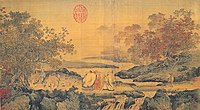
Photo from wikipedia
Abstract Dispositional awe refers to the tendency or trait of awe that is a universal and complex human experience. However, the factors influencing this awe have rarely been addressed. For… Click to show full abstract
Abstract Dispositional awe refers to the tendency or trait of awe that is a universal and complex human experience. However, the factors influencing this awe have rarely been addressed. For the first time, the current study explores the relationship between Honesty-Humility (H-H) and dispositional awe and the mediating role of a Zhong-Yong thinking style (ZY) in Confucian culture. A large sample of 2377 Chinese undergraduates ranging from 18 to 26 years old (mean: 20.7 years, SD = 1.7) was recruited via a cluster sampling. As predicted, H-H was positively correlated with dispositional awe, and this relationship was mediated by ZY. Though H-H was not significantly and directly correlated with dispositional awe in males, multiple-group structural equation modeling supported gender invariance in its direct and mediating effects. The implication of this study has been discussed.
Journal Title: Personality and Individual Differences
Year Published: 2020
Link to full text (if available)
Share on Social Media: Sign Up to like & get
recommendations!